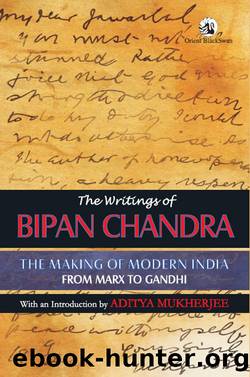The Making of Modern India: From Marx to Gandhi by Bipan Chandra

Author:Bipan Chandra
Language: eng
Format: azw3
Tags: The Writings of Bipan Chandra: The Making of Modern India: From Marx to Gandhi
Publisher: Orient Blackswan
Published: 2012-03-30T16:00:00+00:00
IV
Here, I would like to discuss the major characteristics which Marx believed at one time or the other, and especially during the 1850s when his major comments on colonialism were made, to demarcate Indian and other Asian societies from European societies. Since he put differing emphasis on these characteristics at different times, they are discussed here more or less in the order in which they made their appearance in his writings.
ORIENTAL OR ASIATIC DESPOTISM OR THE CHARACTER OF THE ASIAN STATE
The first specific feature of Asian societies to be noted by Marx was the despotic and hypertrophied character of the State. This character arose, he first suggested in 1853, primarily because of the geographical and climatic factor that the arid lands of Asia could not be brought under cultivation on a large enough scale without artificial irrigation by canals and waterworks, also on a large scale. The village communities, separately or in association, were unable to undertake such large-scale irrigation because of the vastness of territories involved and the low level of civilisation.12 The result was that this function was exercised by the Government which had to be a centralising power to be able to fulfil the task. This inevitably led to the coming into existence of the powerful and centralised despotic Asian State.13 A similar functional relationship between Asiatic despotism and irrigation is established by Marx in Capital (vol. I), and Engels in the Anti-Dühring.14
An interesting paradox in Marxâs thinking enters at this stage. While postulating a centralised, despotic State as an essential feature of Indian society, he notes in the article, âThe British Rule in Indiaâ that in practice India, when not under the power of the foreign âconquerorâs swordâ often gets âdissolved into as many independent and conflicting States as it numbered towns or even villagesâ. He then goes on to compare India with Italy for âthe same dismemberment in the political configurationâ.15 In other words, centralisation of State power springs not from the inner needs of the economy, when it should lead to the rise of an internal centralising power, but from the need of the foreigner to conquer. It is thus imposed from outside for reasons that pertain to the foreignerâs need and not the internal needs of the peasant. In fact, Marxâs remark that the village communities do not care at all whether empires rose or fell16 would also lead to the conclusion that the peasant was not benefited from centralisation. If centralisation had an essential function in the economy of the village communities, or rather a function that alone enabled them to exist and function, they could hardly have been so unconcerned about the fate of the centralising empires.
In the Grundrisse also Marx suggests that the despotic Asiatic State âwhich is poised above the lesser communitiesâ acquires its legitimacy because it appears to guarantee the conditions which are absolutely necessary to the communities for carrying on productive activity through irrigation, means of communication, etc. But he makes two interesting advances here over his position of 1853.
Download
This site does not store any files on its server. We only index and link to content provided by other sites. Please contact the content providers to delete copyright contents if any and email us, we'll remove relevant links or contents immediately.
| Africa | Americas |
| Arctic & Antarctica | Asia |
| Australia & Oceania | Europe |
| Middle East | Russia |
| United States | World |
| Ancient Civilizations | Military |
| Historical Study & Educational Resources |
Wabi sabi by Kempton Beth(721)
Mr. Selden's Map of China by Timothy Brook(601)
Heroic Hindu Resistance To Muslim Invaders (636 AD to 1206 AD) by Sita Ram Goel(573)
Akbar: The Great Mughal by Ira Mukhoty(543)
The Meaning of India by Raja Rao(537)
Vedic Physics: Scientific Origin of Hinduism by Raja Ram Mohan Roy(535)
Banaras by Diana L. Eck(526)
Philippines--Culture Smart! by Culture Smart!(503)
Mao's Great Famine: The History of China's Most Devastating Catastrophe, 1958-1962 by Frank Dikötter(500)
Food of India by unknow(497)
China Unbound by Joanna Chiu(486)
How to Be a Modern Samurai by Antony Cummins(474)
India--Culture Smart! by Becky Stephen(473)
A History of Japan by R.H.P. Mason & J.G. Caiger(468)
Insurgency and Counterinsurgency by Jeremy Black(465)
North of South by Shiva Naipaul(461)
The Genius of China: 3,000 Years of Science, Discovery, and Invention by Robert Temple(446)
Kim Jong Un and the Bomb by Ankit Panda(431)
The Digital Silk Road by Jonathan E. Hillman(423)
